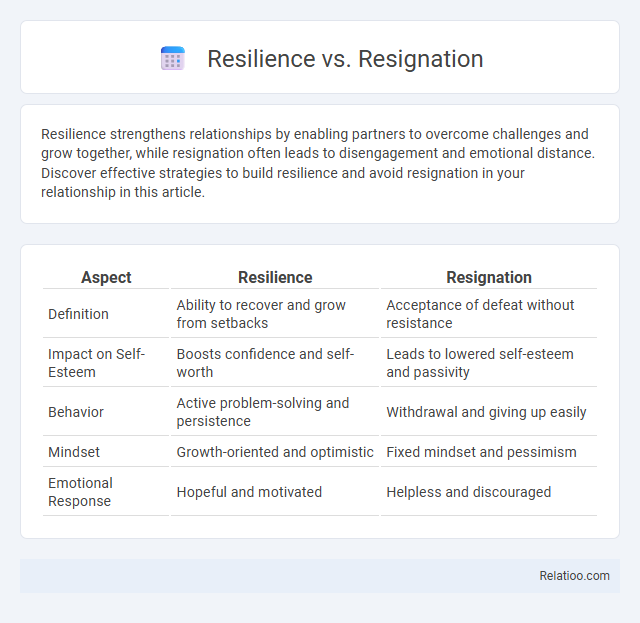Resilience strengthens relationships by enabling partners to overcome challenges and grow together, while resignation often leads to disengagement and emotional distance. Discover effective strategies to build resilience and avoid resignation in your relationship in this article.
Table of Comparison
| Aspect | Resilience | Resignation |
|---|---|---|
| Definition | Ability to recover and grow from setbacks | Acceptance of defeat without resistance |
| Impact on Self-Esteem | Boosts confidence and self-worth | Leads to lowered self-esteem and passivity |
| Behavior | Active problem-solving and persistence | Withdrawal and giving up easily |
| Mindset | Growth-oriented and optimistic | Fixed mindset and pessimism |
| Emotional Response | Hopeful and motivated | Helpless and discouraged |
Understanding Resilience: The Power to Overcome
Resilience is the ability to adapt and recover quickly from adversity, enabling individuals to maintain mental strength and emotional stability during challenging times. Unlike resignation, which involves acceptance of defeat or giving up, resilience empowers proactive problem-solving and persistence despite setbacks. Developing resilience enhances psychological well-being, promotes growth, and strengthens an individual's capacity to navigate stress and recover from traumatic events.
Defining Resignation: Acceptance or Surrender?
Resignation involves a complex psychological state that can be seen as either acceptance or surrender depending on context; it is often characterized by a passive acknowledgment of circumstances without active resistance. Unlike resilience, which entails adaptive coping and persistence, resignation typically signals a withdrawal from efforts to change or improve a situation. Understanding resignation requires examining emotional responses such as defeat, helplessness, or pragmatic acceptance, highlighting its nuanced role in mental health and decision-making processes.
Key Differences Between Resilience and Resignation
Resilience is the ability to adapt and recover from challenges, maintaining a positive outlook and continuing to pursue goals despite setbacks. Resignation involves accepting defeat or giving up in the face of difficulties, often accompanied by feelings of helplessness or surrender. Understanding these key differences can empower Your mindset, encouraging perseverance rather than passive acceptance when confronted with adversity.
Psychological Roots of Resilience
Psychological roots of resilience stem from an individual's ability to adapt positively in the face of adversity, drawing on cognitive flexibility, emotional regulation, and a strong sense of self-efficacy. Unlike resignation, which reflects passive acceptance and feelings of helplessness, resilience involves proactive coping strategies and the capacity to recover from stress, trauma, or failure. Scientific studies highlight the role of supportive social networks, mindset, and neurobiological factors such as the regulation of the hypothalamic-pituitary-adrenal (HPA) axis in fostering resilience.
Why Do People Resign?
People resign primarily due to dissatisfaction with their work environment, lack of career growth, or unmet expectations, which negatively impact their motivation and job satisfaction. Resilience allows individuals to adapt and overcome workplace challenges, maintaining engagement and productivity, while resignation occurs when stress and frustration lead to disengagement and the decision to leave. Understanding your reasons for resignation can help identify whether strengthening resilience skills or seeking new opportunities aligns better with your career goals.
Building Resilience in Everyday Life
Building resilience in everyday life involves developing mental toughness and adaptive coping strategies to face challenges effectively without succumbing to resignation. Emphasizing emotional regulation, positive self-talk, and problem-solving skills strengthens an individual's ability to rebound from setbacks. Consistent practice of mindfulness, social support, and goal-setting enhances resilience, reducing the tendency to passively accept adverse circumstances.
The Impact of Resilience on Mental Health
Resilience significantly enhances mental health by enabling you to adapt to stress, recover from setbacks, and maintain emotional stability during challenging times. Unlike resignation, which often leads to feelings of helplessness and increased vulnerability to anxiety and depression, resilience fosters a proactive mindset that strengthens psychological well-being. Building resilience through techniques like mindfulness, social support, and positive coping strategies can reduce the risk of chronic mental health issues and improve overall life satisfaction.
Consequences of Chronic Resignation
Chronic resignation often leads to diminished motivation, decreased productivity, and increased risk of mental health issues such as depression and anxiety. Unlike resilience, which fosters adaptability and growth through adversity, ongoing resignation results in a passive acceptance of challenges, stalling personal and professional development. Over time, this persistent surrender to difficulties can erode self-esteem and limit future opportunities for success.
Cultivating a Resilient Mindset
Cultivating a resilient mindset empowers you to adapt and thrive amid challenges, distinguishing resilience from resignation, which often involves surrendering to circumstances. Resilience builds mental strength and emotional agility, enabling proactive problem-solving and growth, whereas resignation can lead to stagnation and decreased motivation. Fostering resilience involves embracing setbacks as learning opportunities, maintaining optimism, and developing coping strategies to sustain focus on long-term goals.
Choosing Resilience Over Resignation: Practical Strategies
Choosing resilience over resignation empowers you to overcome challenges by fostering a growth mindset and proactive problem-solving skills. Practical strategies include setting realistic goals, cultivating emotional awareness, and leveraging support networks to maintain motivation during adversity. Embracing resilience accelerates personal and professional growth, transforming setbacks into opportunities for success.

Infographic: Resilience vs Resignation
 relatioo.com
relatioo.com